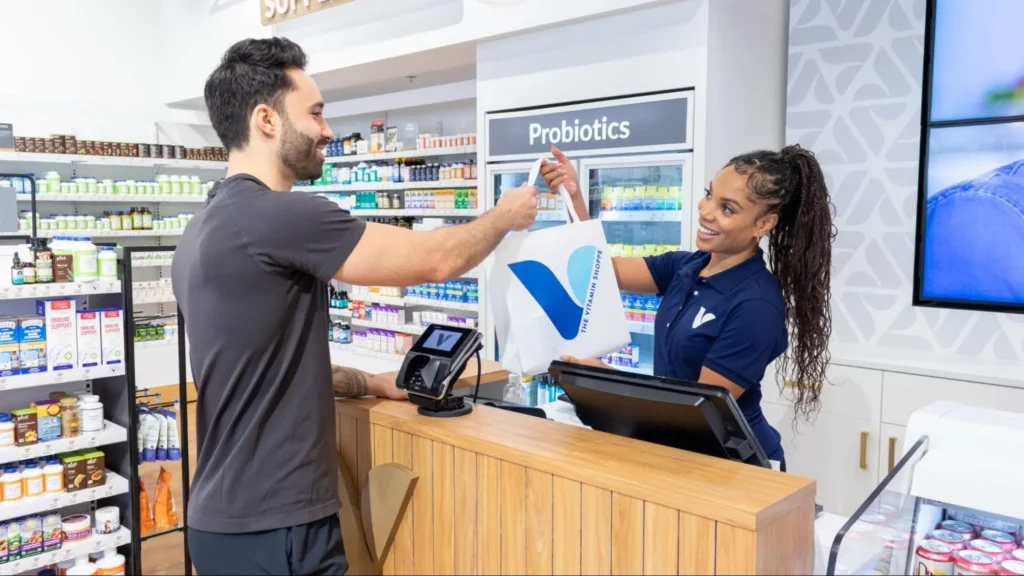The Business of GLP-1s: Inside the New Weight Loss Drug Ecosystem

As weight loss drugs surge, here’s how telehealth companies and brick-and-mortar fitness giants are responding to the Ozempic era
Weight loss medication has upended the diet industry and shows no signs of slowing down, with medication shortages only compounding the demand for GLP-1 drugs, which can help patients lose 15% or more of their body weight.
Regardless of the various opinions on medications like Ozempic and Wegovy, the blockbuster drugs can have far-ranging impacts beyond slimming down Americans — Goldman Sachs estimates that they could raise U.S. GDP levels and, at last count, analysts forecast that weight loss medications will likely generate as much as $100 billion in revenue by 2030.
With so much financial promise and a prediction that 9% of the U.S. population will eventually become a GLP-1 user in just six years, nearly every industry is looking to integrate weight loss medication or support its users in one aspect or another. Even food and beverage giant Nestlé is releasing a frozen food line for people on GLP-1 drugs.
As weight loss drugs continue to have a sizable impact at every turn, here is how telehealth companies and brick-and-mortar fitness giants are responding to the Ozempic era.
Diet Industry Heavyweights Embrace Weight Loss Drugs
WeightWatchers was undoubtedly ahead of the game, acquiring telehealth provider Sequence last year to become one of the first to offer weight loss drugs to consumers — a far departure from its original goal as a diet and weight loss OG.
“WeightWatchers is at a pivotal point where we can build new capabilities that expand our market, reinforced by our foundational strengths,” former WeightWatchers CEO Sima Sistani remarked regarding the Sequence deal. “Our goal is to provide sustainable, science-backed solutions to all weight health pathways, whether medications are part of an individual’s journey or not.”
The Vitamin Shoppe, a titan in the brick-and-mortar supplement space, is also getting into the GLP-1 game, launching a telehealth service connecting eligible consumers with licensed healthcare providers to offer nutritional supplements and anti-obesity drugs such as Ozempic and Mounjaro, as well as compounded versions of semaglutide and tirzepatide, the active ingredient in Zepbound.
The Vitamin Shoppe CEO Lee Wright says the company’s Whole Health Rx service is a “meaningful evolution” in its mission to support the needs of its customers – a similar signal to that of WeightWatchers. While it will initially focus on weight management, Whole Health Rx plans to expand into other verticals.
“As a pioneer in the wellness space since 1977, The Vitamin Shoppe is uniquely positioned to offer a truly holistic approach to weight loss that unites proven pharmaceutical interventions with our unmatched expertise in nutrition support and whole-body health,” Wright added.

New Telehealth Players Emerge
Hims & Hers Health may not have rushed into the GLP-1 space, but it’s done so mindfully — and at a discounted rate. The telehealth platform, witnessing the ongoing shortages of name-brand anti-obesity drugs, will now provide compounded GLP-1s for eligible consumers. The company has partnered with a U.S. drug manufacturer to provide generic medications with the same active ingredients as the Ozempic and Wegovy, shipping them from affiliated pharmacies at a more cost-conscious price point. In time, the health and wellness platform says it will make branded options available after a consistent supply is established.
“The core of our business is to offer a truly personalized experience that customers can trust and rely on,” Hims & Hers CEO and co-founder Andrew Dudum said. “We’ve leveraged our size and scale to secure access to one of the highest-quality supplies of compounded GLP-1 injections available today. We’re passing that access and value along to our customers, who deserve the highest standard of clinical safety and efficacy to meet their goals, and we’re doing it in a safe, affordable way that others can’t deliver.”

Telehealth company Ro, which counts obesity expert Dr. Rachel Goldman as an advisor, is also transforming the way consumers access GLP-1s.
“GLP-1s are allowing individuals who have the disease of obesity to be on a level playing field,” Dr. Goldman said. “They have this extra tool that is helping them get to a place where they’re more in that category of individuals who, if they’re mindful about what they’re eating and exercising a little more, they will likely lose weight. It’s literally giving people hope who felt like they lost hope. Some people saw an option like bariatric surgery as a last resort but GLP-1s are now giving people an additional option. We are also seeing that people after bariatric surgery have weight (gain) recurrence because obesity is a chronic disease.”

Fitness Brands Cater to GLP-1 Users
Weight loss drugs have also inspired fitness operators to capitalize on consumers looking to lose.
Last year, luxury athletic country club operator Life Time entered the weight loss medication arena with Miora, a medical wellness and longevity clinic featuring GLP-1s as well as infrared saunas, red light therapy, peptides, hormone replacement therapy, IV therapy and cryotherapy chambers.
While Miora is poised to roll out nationally, the clinic is already seeing high demand,
and Life Time is bolstering Miora’s staff of doctors and physician assistants to handle the traffic.
Life Time founder and CEO Bahram Akradi has been outspoken on weight loss medication, noting that the athletic country club brand has the ideal customer base within its clubs – those who seriously invested in their health – and stated that the popular drugs will remain a “megatrend.”
“It’s going to stay, and it’s not a negative for exercise because you absolutely need to combine the proper weight training and nutrition with these drugs,” Akradi said. “The exercise business is going to get a win out of it. Life Time is uniquely positioned because, in every market, we have facilities where we can launch Miora Clinics for longevity, for addressing weight loss, peptides, all of that,” he said. “We look at this as nothing but an upside.”
Equinox, now heavily invested in metabolic health and longevity with Function Health, hasn’t abandoned the weight loss medication space or Equinox members who opt to take the in-demand drugs. The luxury fitness and wellness brand is committed to helping its members with a personal training program designed for clients on medication like Ozempic and Wegovy or those interested in using GLP-1s.
The brand added a GLP-1 protocol to its internal education program at the Equinox Fitness Training Institute to ensure coaches learn how to create workout plans that address possible muscle loss — a side effect that can occur for those taking weight loss medication.
Digital healthcare company Noom partnered with digital health and fitness platform FitOn to launch “Muscle Defense,” a program designed to combat muscle mass loss with on-demand fitness programming geared towards weight loss medication users.
“We designed Noom GLP-1 Companion with Muscle Defense to be the adjunct diet and exercise program that addresses key dangers associated with taking GLP-1s such as loss of muscle mass,” Noom CEO Geoff Cook explained. “We believe prescribing the drug without such a program carries dangers, given the amount of muscle mass people often lose while taking a GLP-1 and the fact that most people will stop taking the GLP-1 and regain the weight absent of behavior change, which can potentially lead to future conditions like sarcopenic obesity.”
“It’s critical we not leave people worse off than before they started the medication. Healthy habits have never mattered more,” Cook added.
This article originally ran in the The Business of Prevention, Recovery & Longevity Report 2024. Download the report now to read more insights into how fitness and wellness brands are making strides in key markets.
Courtney Rehfeldt has worked in the broadcasting media industry since 2007 and has freelanced since 2012. Her work has been featured in Age of Awareness, Times Beacon Record, The New York Times, and she has an upcoming piece in Slate. She studied yoga & meditation under Beryl Bender Birch at The Hard & The Soft Yoga Institute. She enjoys hiking, being outdoors, and is an avid reader. Courtney has a BA in Media & Communications studies.



